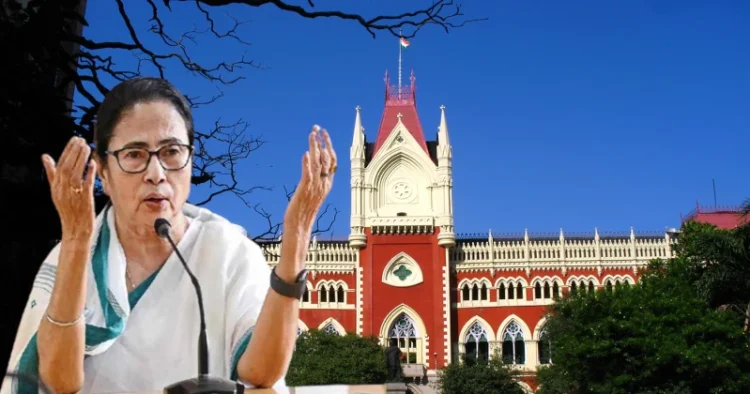A group of attorneys has approached the Calcutta High Court, urging it to take cognizance of statements made by All India Trinamool Congress (TMC) chief and West Bengal Chief Minister Mamata Banerjee against the High Court. The attorneys sought action on a suo motu basis, following Banerjee’s allegations that the High Court had been “sold out.” These remarks came in the aftermath of the High Court’s judgment in the Jobs for Cash scandal, which led to the annulment of approximately 24,000 teacher appointments.
Senior advocate and Communist Party of India (Marxist) leader Bikash Ranjan Bhattacharya spearheaded the plea, emphasising the need for strict action against Banerjee for her “contemptuous” remarks. Bhattacharya asserted that the Chief Minister’s statements amounted to criminal contempt and submitted newspaper reports as evidence to support his claim.
The petition underscored Banerjee’s persistent attempts to denigrate the judiciary and ridicule the High Court in the public eye. Bhattacharya highlighted the Chief Minister’s consistent derogatory remarks following the Court’s judgment, aimed at undermining the judiciary’s integrity. He pledged to file an affidavit and provide translations of Banerjee’s statements to the Court for consideration.
In response to the plea, the Court inquired about the possibility of submitting a petition to obtain the case record. Bhattacharya assured the Court of including an affidavit along with the newspaper reports detailing Banerjee’s statements. Additionally, he pledged to take further action by 2:00 p.m. on the matter.
Subsequently, two additional attorneys attempted to file petitions related to Banerjee’s remarks, further highlighting the significance of the issue. The Court permitted the filing of these petitions and acknowledged media reports documenting Banerjee’s controversial statements.
During the afternoon session, the Court addressed the matter raised by Bhattacharya, advising that all relevant case documents be presented to the Chief Justice for administrative review before any further action is taken.
Banerjee’s allegations against the Calcutta High Court stemmed from its decision to cancel all appointments made through a 2016 teacher recruitment test, which she deemed “illegal.” Speaking at an electoral rally, Banerjee criticised the judiciary’s verdict and accused leaders of the Bharatiya Janata Party (BJP) of influencing judicial outcomes.
The High Court’s ruling, which annulled the appointments made beyond the official panel and after its expiry, elicited strong reactions from Banerjee. She assured affected individuals of pursuing justice through higher judicial channels, including the Supreme Court.
In light of the Court’s directive, the Central Bureau of Investigation was tasked with conducting further inquiries into the illegal appointments and recommended prison interrogations if necessary.
The developments surrounding Banerjee’s remarks and the High Court’s response underscore the delicate balance between judicial independence and political discourse in West Bengal, particularly amidst the backdrop of ongoing electoral tensions. As the legal proceedings unfold, all eyes remain on the Calcutta High Court’s deliberations and the potential ramifications of Banerjee’s controversial allegations on the state’s political landscape.




















Comments